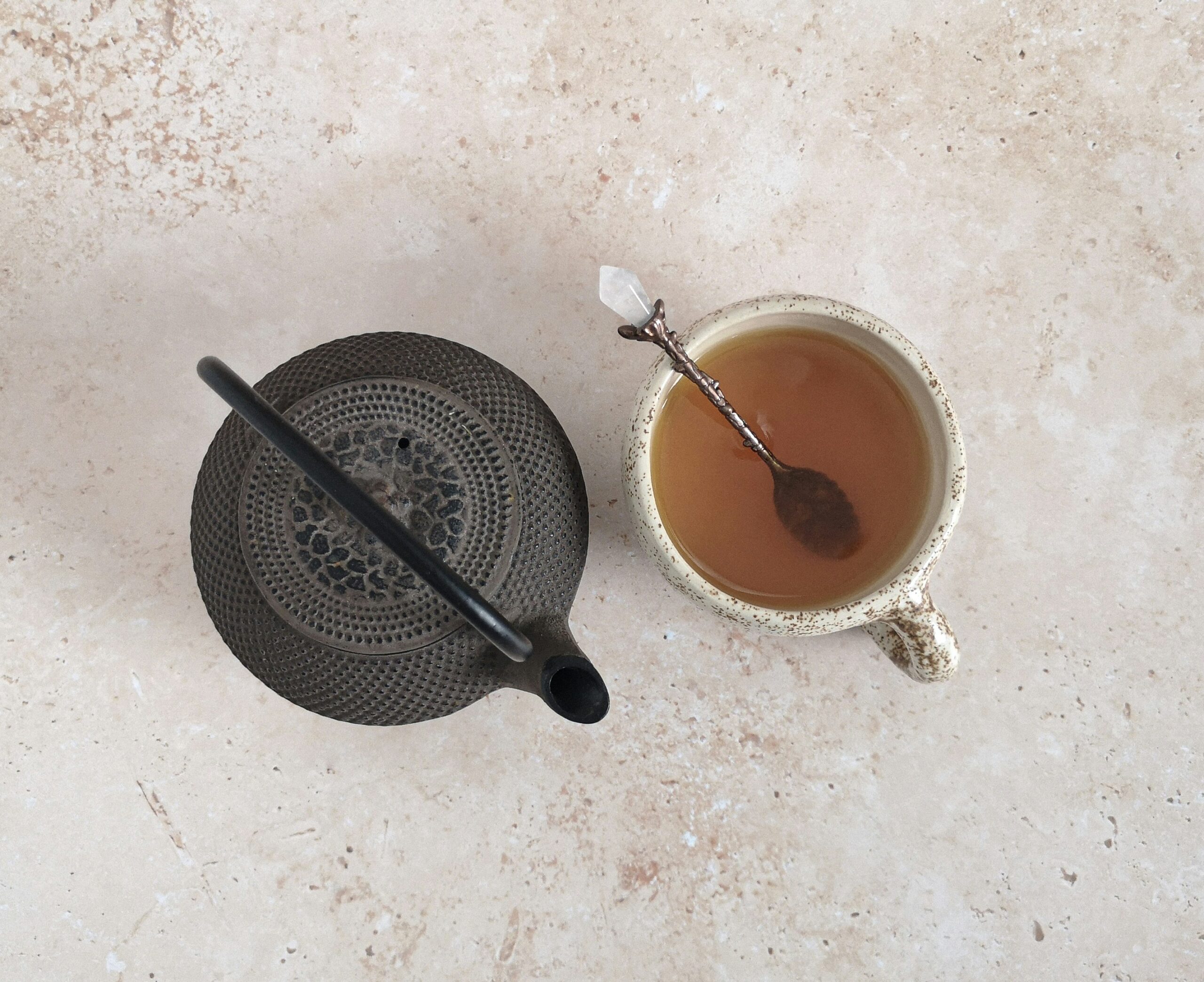
Eczema, a common skin condition, often brings discomfort with its itching and redness. This can lead sufferers to look for effective ways to manage symptoms. Among various options, herbal remedies stand out for their natural properties and potential to soothe irritated skin. Some of the best herbs for eczema include Chinese herbal medicines, which have been used for years to treat this condition.
Chinese herbal medicines have shown promise in easing eczema symptoms. Studies suggest that these herbs can help reduce inflammation and improve skin health. Using these herbs may offer a gentler alternative to conventional treatments.
Discovering the right herbs and practices for your eczema can provide relief and improve quality of life. Exploring different herbal options and pairing them with skincare tips and dietary changes can make a noticeable difference in managing eczema efficiently.
Key Takeaways
- Eczema causes discomfort with itching and redness.
- Chinese herbal medicines may help reduce eczema symptoms.
- Lifestyle changes can improve eczema management.
Understanding Eczema
Eczema is a chronic inflammatory skin condition that often brings discomfort and affects many people. It is characterised by red, itchy patches on the skin. Flare-ups can be triggered by various factors such as stress, weather changes, or irritants, leading to more severe symptoms.
The immune system plays a significant role in eczema. When it overreacts to certain triggers, it can cause inflammation and exacerbate the condition. Keeping your immune system balanced might help reduce the severity of eczema flare-ups.
Some common causes of eczema include genetic factors, allergies, and environmental elements. Understanding what causes your eczema can help you manage and prevent flare-ups more effectively. Identifying your personal triggers is crucial to controlling this skin condition.
Eczema may also be affected by diet and hygiene habits. Some people find relief by using natural remedies such as Chinese herbal medicine in combination with conventional treatments.
Managing eczema involves addressing both symptoms and triggers. Moisturisers and anti-inflammatory treatments are commonly used. Staying informed about eczema flare-ups and understanding their causes can empower you to take better care of your skin.
Using herbal treatments can sometimes offer relief, but it’s essential to consult with a healthcare professional before trying new remedies. Begin with a patch test to ensure no adverse reactions occur.
Common Symptoms and Triggers
Eczema often brings discomfort due to its main symptoms and can be triggered by various environmental and internal factors. Understanding these elements is key in managing and preventing eczema flare-ups.
Identifying Symptoms
Eczema presents with various symptoms that can make daily life uncomfortable. Commonly, you might experience itchy skin, which can be intense and persistent. Dry skin is also typical, often leading to rough and scaly patches that may blister.
In some cases, these blisters might break open, leading to weeping. This can cause further skin irritation, creating a cycle where the more you scratch, the more the skin gets inflamed.
Environmental and Internal Triggers
There are numerous triggers that can activate or worsen eczema. Environmental factors like temperature changes, humidity, and exposure to irritants such as soaps or detergents play a significant role.
Stress is a well-known trigger, making emotional well-being crucial to managing eczema. Allergens, including pollen and pet dander, can also provoke reactions.
Additionally, food allergies are common internal triggers. Foods like eggs, nuts, and dairy may cause flare-ups in susceptible individuals. Being aware of these factors helps in finding effective ways to manage them.
Herbal Remedies for Eczema
Herbal remedies are often sought after for managing eczema, focusing on alleviating symptoms like itchiness and inflammation. The herbs discussed below offer various benefits, such as anti-inflammatory and antibacterial properties. They are used in creams, oils, and teas to support skin health.
Chamomile
Chamomile is well-known for its calming effects. It can help reduce eczema symptoms by soothing irritation and reducing itchiness. Chamomile contains anti-inflammatory and antimicrobial properties, which assist in calming inflamed skin.
Applying chamomile as a topical cream or in a bath can provide relief. You can create chamomile tea and let it cool, then apply it with a cloth to the affected areas. Chamomile can be a gentle option for sensitive skin, making it a popular choice among natural remedies.
Turmeric
Turmeric is recognised for its potent anti-inflammatory properties. Its active compound, curcumin, can help in reducing skin inflammation and redness.
When used on the skin, turmeric may support wound healing due to its antibacterial properties. You can make a paste by mixing turmeric powder with water or coconut oil and apply it to the eczema patches. This remedy might stain your skin temporarily, but its skin-soothing benefits are often worth it.
Witch Hazel
Witch hazel is known for its astringent properties, making it effective in reducing skin inflammation. It helps cleanse the skin and tightens pores, which may reduce the frequency of eczema flare-ups.
Witch hazel can be applied directly to the skin using a cotton pad. Its antibacterial benefits help to keep the skin clean, potentially minimising irritation and infection risks. This herb is commonly used in various over-the-counter skin products aimed at soothing irritated skin.
Calendula
Calendula, or marigold, is famed for its wound-healing qualities. It also offers anti-inflammatory benefits that may reduce eczema symptoms.
Often found in creams and ointments, calendula can soothe itchiness and speed up the healing process. By applying calendula-based products to your skin, you can take advantage of its antimicrobial and antibacterial benefits, thus supporting healthier skin.
Evening Primrose Oil
Evening primrose oil is extracted from the seeds of the evening primrose plant and contains gamma-linolenic acid (GLA). This compound is believed to help soothe eczema symptoms by reducing inflammation and itchiness.
Used both topically and as a supplement, evening primrose oil may help improve skin hydration and repair the skin barrier. For best results, consider applying the oil directly to eczema-affected areas or including it in your diet after consulting a healthcare provider.
Comfrey
Comfrey is valued for its wound-healing and anti-inflammatory effects. The plant contains allantoin, which supports skin cell regeneration.
Comfrey can be used as a compress or added to baths to relieve eczema symptoms. When using comfrey, do so with caution and limit duration, as its potent effects are best managed under careful use. Despite its strong properties, some find it immensely soothing for eczema-related discomfort.
Nettle
Nettle is an herb noted for its anti-inflammatory properties, which can be beneficial in soothing eczema symptoms. It’s also used as a mild astringent.
You can consume nettle as a tea or apply it topically. Drinking nettle tea may reduce overall skin inflammation and boost your skin’s health. For external use, nettle extracts or infused oils can be applied to calm irritated skin.
Cleavers
Cleavers, also known as goosegrass, are helpful in clearing toxins from the body and promoting skin health. They are known to aid in reducing inflammation and support wound-healing.
By making a cleavers tea and applying it to the skin, you can take advantage of its soothing benefits. Drinking the tea might also help improve complexion. It is often used in herbal skin remedies due to its gentle yet effective properties.
Yarrow
Yarrow is another herbal remedy used for its anti-inflammatory and wound-healing benefits. It has astringent properties that can help tighten skin and reduce swelling.
You can use yarrow as a topical treatment by steeping the dried flower in hot water to make a wash. Once it cools, apply it to the affected skin. Yarrow’s antibacterial qualities may help protect the skin from infections, adding to its appeal as an eczema remedy.
Additional Natural Ingredients
Exploring natural ingredients can enhance your skincare routine for eczema. Coconut oil, aloe vera, honey, and sunflower seed oil offer distinct benefits. These ingredients support skin hydration, provide soothing properties, and help in maintaining a healthy skin barrier.
Coconut Oil
Coconut oil is well-known for its moisturising properties. It’s rich in lauric acid, which helps to hydrate and soothe your skin. Coconut oil acts as an emollient, locking in moisture and creating a protective barrier. This can help reduce itching and flakiness associated with eczema.
When applying coconut oil, it’s best to use it after bathing when your skin is still damp. This ensures better absorption. Make sure to use virgin coconut oil for optimal benefits. Its natural composition also has antibacterial and anti-inflammatory properties, which can further aid in calming irritated skin.
Aloe Vera
Aloe vera is another excellent natural remedy for eczema. Known for its cooling and soothing properties, aloe vera can alleviate itching and redness. The gel-like substance from the aloe vera plant contains vitamins, minerals, and antioxidants that support skin health.
Applying fresh or commercially prepared aloe vera gel can help improve your skin’s moisture levels. It creates a thin layer that protects your skin from dryness and irritation. Before using, ensure you’re not allergic by performing a patch test. Aloe vera’s ability to enhance skin barrier function makes it a popular choice for eczema relief.
Honey
Honey, particularly Manuka honey, is a powerful ingredient for managing eczema. Its natural antibacterial and anti-inflammatory properties can reduce skin irritation and prevent infection. Honey also helps keep your skin hydrated, promoting healing and reducing dryness.
When using honey, apply a thin layer directly to affected areas. Leave it on for a short period before rinsing it off with warm water. Manuka honey is especially prized for its additional health benefits due to its higher antibacterial activity. Regular use can improve skin texture and provide relief from eczema symptoms.
Sunflower Seed Oil
Sunflower seed oil is beneficial for maintaining the skin barrier function. Rich in essential fatty acids, this oil moisturises and nourishes your skin without causing irritation. Sunflower oil can reduce inflammation, helping to soothe and calm eczema-prone skin.
Using sunflower seed oil regularly can improve hydration by forming a protective layer on your skin. This gentle oil is suitable for all skin types and can be especially advantageous for sensitive skin. Incorporating it into your skincare routine can lead to healthier and more resilient skin over time.
Lifestyle and Dietary Considerations
Understanding the impact of your diet, skincare routine, and stress levels can play a significant role in managing eczema. These factors influence skin health and can either alleviate or worsen the condition.
The Role of Diet
Your diet can have a profound effect on eczema. Certain foods might trigger flare-ups. Many people find that controlling allergens, such as dairy or nuts, helps manage symptoms. Including foods rich in vitamin D and probiotics can support skin health and boost the immune system. Foods like salmon, eggs, and yogurt are beneficial. Stay hydrated and consider consulting a nutritionist for personalised advice. Maintaining a balanced diet can be an effective part of eczema treatment.
Importance of Moisturising
Keeping your skin well-moisturised is essential to manage eczema’s dryness. Regular use of a suitable moisturiser helps maintain the skin’s barrier. Look for products that are fragrance-free and contain ingredients like ceramides or hyaluronic acid. Moisturise immediately after bathing to lock in moisture. This simple step can reduce itching and protect against irritants. Consistent application of moisturiser can make a noticeable difference in your skin’s condition.
Stress Management
Managing stress is crucial in controlling eczema, as stress can trigger or exacerbate symptoms. Techniques such as mindfulness, yoga, and deep breathing exercises can be effective in reducing stress levels. Establish a regular routine for relaxation and self-care. Finding time for activities you enjoy also helps in managing daily stress. Being proactive about stress management is an important part of keeping eczema symptoms under control.
Alternative Eczema Treatments
When dealing with eczema, you might explore other ways to alleviate symptoms. Methods like acupuncture, Ayurvedic medicine, and home remedies offer different approaches. Each has its unique techniques that aim to soothe and manage eczema naturally.
Acupuncture
Acupuncture is an ancient practice rooted in Chinese medicine. It involves inserting tiny needles into specific points on your body. This method aims to balance your body’s energy, or qi, which can reduce inflammation and itchiness experienced with eczema.
Research suggests acupuncture could lead to less stress and better blood flow, which might help your skin condition. If you are considering it, look for a qualified practitioner experienced in treating eczema. Discuss any concerns you have before starting the treatment.
Ayurvedic Medicine
Ayurveda is a holistic approach originating from India. It emphasises balancing your body’s energies: Vata, Pitta, and Kapha. In this practice, eczema is often viewed as an excess of Pitta and requires dietary changes, herbal remedies, and lifestyle adjustments.
Common Ayurvedic herbs used for eczema relief include neem, turmeric, and sandalwood. These herbs are believed to have soothing properties that could help your skin. Consulting an Ayurvedic specialist can guide you on using these treatments effectively as part of your daily routine.
Home Remedies
Home remedies can be both simple and effective for managing eczema symptoms. Oatmeal baths and coconut oil are popular choices. These natural treatments can help soothe irritated skin and keep it moisturised.
Aloe vera is another home remedy known for its cooling and healing properties. Applying a thin layer to affected areas might help with inflammation. You should also focus on wearing soft clothing and using gentle soaps to reduce irritation triggers. Remember to patch-test any new remedy to ensure it suits your skin type.
Conventional Treatments for Comparison
When managing eczema, you may encounter a variety of conventional treatment options.
Topical Steroids
Topical steroids are commonly prescribed to reduce itching and inflammation. These are applied directly to the skin in varying strengths, depending on the severity of your eczema.
Prescription Medications
In some cases, your doctor might prescribe medications like corticosteroids. These are often used for severe eczema and are taken in pill form. They help to control symptoms and prevent flare-ups.
Antihistamines
Antihistamines can be useful if you experience significant itching, especially at night. They work by reducing your body’s response to allergens, which can help improve your comfort and sleep quality.
Topical Applications
Apart from steroids, other topical applications include moisturisers and calcineurin inhibitors. Moisturisers help keep your skin hydrated, while calcineurin inhibitors target inflammation and immune response without the side effects of steroids.
Treatment Plan
Always consult with your healthcare professional to create a personalised treatment plan. This involves evaluating the severity of your condition and discussing any previous treatments you’ve tried.
Each treatment option serves a unique role in managing eczema. Discuss with your healthcare provider to determine what might be best for your needs. Regular follow-up and monitoring can help in adjusting treatments as necessary.
Skincare Tips for Eczema Management
Managing eczema involves both skincare routines and lifestyle changes. To reduce skin inflammation, you can start with simple modifications.
Bath Treatments
Regular baths help keep your skin clean and reduce dryness. Adding a colloidal oatmeal bath can soothe your skin. A bleach bath, when used correctly, can decrease bacteria but should be done cautiously.
Moisturising
Apply a rich, unscented moisturiser after every bath to lock in moisture. This helps maintain skin health by preventing dryness.
Wet Wraps
Using wet wraps involves applying wet bandages over a moist layer of cream. This increases skin hydration and can reduce itching.
Detergents and Soaps
Choose mild, fragrance-free detergents and soaps. Harsh chemicals can worsen eczema symptoms, so gentle products are best.
Environmental Factors
Maintain a comfortable indoor humidity level. Use a humidifier if needed, especially in dry climates. Avoid sudden temperature changes which might trigger flare-ups.
Clothing Choices
Wear soft, breathable fabrics like cotton. Avoid wool or synthetic materials which can irritate your skin.
By following these tips, you can help manage eczema symptoms more effectively. Remember, natural remedies for eczema, like baths with soothing ingredients, can be a part of your skincare plan.
Preventing Eczema Flare-Ups
Eczema flare-ups can cause discomfort and irritation. Identifying and avoiding triggers is essential in managing these. Common triggers include certain foods, stress, and allergens. Keeping a diary can help you track these triggers and reduce flare-ups.
Moisturising your skin regularly is important. Use emollient creams and lotions with ingredients like allantoin. These help to strengthen the skin barrier and prevent dryness, a key cause of flare-ups.
Maintaining good hygiene helps avoid skin infections. Bathing in lukewarm water and using mild soap can protect your skin. Pat your skin dry gently after bathing, avoiding any harsh rubbing.
Natural remedies can offer relief. Certain herbs with anti-inflammatory effects can be beneficial. Always consult your healthcare provider before using herbal treatments to ensure they’re safe for you.
To help relieve itching, keep your nails short and avoid scratching. Wearing loose, cotton clothing can also reduce irritation and help keep you comfortable during flare-ups.
RELATED: Echinacea Benefits for Skin: Natural Radiance and Healing
RELATED: Pimples on Private Parts Female Home Remedies: Gentle Solutions for Sensitive Skin Concerns



Comments +